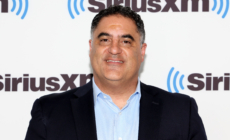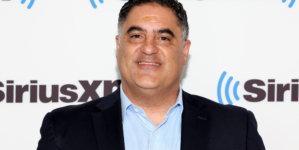-
What Kennedy’s Approach to Addiction Gets Wrong - 12 mins ago
-
Titans Make Decision on Starting Quarterback For Week 16 - 22 mins ago
-
Germany Searches for Motives in Christmas Market Attack - 56 mins ago
-
Dodgers Reportedly Pursuing Blockbuster Trade For Cubs’ Seiya Suzuki - 58 mins ago
-
Democratic Pundit Urges ‘Revolt’ Against Dem Leaders at Conservative Event - 2 hours ago
-
Human Beings Are Not Predators By Nature - 2 hours ago
-
Silver Slugger Award Winner Could Be Next First Baseman Moved: Report - 2 hours ago
-
‘Christmas Adam’ Celebrations on Dec. 23 Spread in Some Parts of the U.S. - 2 hours ago
-
Famous San Pedro fish market signs 49-year lease to stay in West Harbor - 3 hours ago
-
Phillies Acquire Jesus Luzardo From NL East Rival Marlins: Reports - 3 hours ago
UN Plastic Treaty Talks Were Not a Failure, Experts Say at Newsweek Panel
On the heels of global negotiations over a plastic waste treaty, Newsweek Environmental Sustainability and Governance Editor Jeff Young hosted a panel discussion on current efforts to reduce plastic pollution, at One World Trade Center in New York City on Wednesday, December 4.
“The Future of Plastics: Reducing Waste and Rethinking Materials,” sponsored by Kia, was the latest panel in the Newsweek Horizons event series. It brought together panelists and guests from various industries to discuss the current state of global plastic waste and the solutions that are already making a difference.
Panelists included Jessica Long, chief strategy officer and head of Closed Loop Partners’ operating group Closed Loop Builders; Erin Simon, the vice president and head of plastic waste and business at the World Wildlife Fund; U.S. Plastics Pact CEO Jonathan Quinn; Mars Global Vice President of Packaging Sustainability Allison Lin; and Dr. Leonardo Trasande from the NYU Center for the Investigation of Environmental Hazards.
This event came days after the United Nations failed to agree on a treaty in Busan, South Korea, limiting plastic waste polluting the planet. These talks were the fifth session of the Intergovernmental Negotiating Committee, referred to as INC-5, which began in 2022 and are set to continue next year. Three of the panelists, Trasande, Simon and Lin, were all present at this year’s session.

Marleen Moise
In his opening remarks, Newsweek Chief Strategy Officer Dayan Candappa noted that the media coverage after the negotiation was “dispirited.”
“After the events in Busan, we are all gathered here in the name of hope,” he said. “It seems like, once again, the most capable species ever to inhabit this planet was shrinking from the challenge of saving it.”
But the panelists onstage had a different perspective on the outcome of the treaty talks.
Erin Simon of the World Wildlife Fund was disappointed to walk away from the talks without a strong treaty but said that doesn’t mean the week was a failure.
While she didn’t get the treaty she wanted, she was glad to see the mobilization of a progressive majority demanding a treaty that “has a lot of teeth.” Simon added that the text that was delivered at the end of the INC-5 talks has “good bones” to help negotiations moving forward.

Marleen Moise
Allison Lin of Mars said a better treaty is worth waiting for.
“We would rather have a little bit more time to get a really strong treaty with global obligations than a weak and watered-down treaty,” she said.
She said a weaker treaty would make it more difficult to scale and drive solutions that will help large and small companies around the world.
“As a company, we want to understand what regulations are going to look like and really drive harmonized regulation that we know will actually tackle the problem with plastic pollution,” she said, including standardized product design, phaseouts of hazardous materials and chemicals, and reductions of plastic production levels.

Marleen Moise
Moderator Jeff Young has written extensively about the treaty talks and welcomed the different perspectives on the outcome, noting that panelists viewed these talks as “another step in the process.”
Looking ahead, Dr. Leo Trasande from the NYU Center for the Investigation of Environmental Hazards at Grossman School of Medicine, is hoping that the treaty discussions will consider independent science.
“I’m glad the treaty process is stalled because we are going to have a better treaty if we work out our issues and don’t rely solely on consensus as a principle for execution of the treaty,” he said. “And, ultimately, we need independent science to carry the day. We need conflicts of interest to be disclosed and we need the best available science to inform that process.”
The conversation then turned to the current state of the country’s recycling.
According to a 2021 report from the United Nations Environment Programme, there are 400 million metric tons of plastic produced globally each year. Of that, only 9 percent has been recycled. The remaining plastic waste is incinerated or ends up in landfills or in waterways, endangering wildlife, damaging the environment and harming human health.
During the discussion, Young referenced a recent survey from Keep America Beautiful that found that 63 percent of participants graded the U.S. recycling performance a “C” or lower, with 22 percent giving a grade of “D” or “F.”
When Young asked the panelists to describe plastic recycling in the U.S. in one word, they responded with answers including “unhealthy,” “broken,” “inefficient” and “promising.”
With the current state of the plastic pollution crisis, simply recycling products isn’t enough anymore. Panelists noted the need to prioritize removing harmful materials and chemicals from products, reducing single-use plastic production and sorting materials that can be reused in the supply chain.

Marleen Moise
A transition to a circular economy that keeps materials and products in circulation for as long as possible is key to reducing waste and promoting sustainability.
“We hear a lot of things, the headlines out there saying things like recycling doesn’t work, the systems are broken,” Jessica Long of Closed Loop Partners said. “I truly don’t think that’s the case. They’re just not effective, or not as effective as they could be, and they’re definitely not at scale.”
Investing properly in different business models and better infrastructure, she said, will be better for the economy and the environment. This includes offering more economic incentives for companies to create products and packaging that are recyclable and reusable.
While it is easy to feel dismayed or defeated when considering the current state of plastic waste around the world, these panelists assured the audience that there is hope for a better future.
“We have the data, we have the science, we have the business models, we have the innovators, we have the innovations out there that get all of those different levers to reduce that volume,” Long said. “Solutions exist [and] we have the people needed to actually solve the problem.”

Marleen Moise
Even as negotiators walked away from the U.N. treaty discussion without a plan, those present said the talks created a framework for what solutions can be implemented and motivated different stakeholders to take action and push good legislation.
Jonathan Quinn of U.S. Plastics Pact said these conversations cannot just be about policy but also need to involve consumers.
“We’re doing this for the next generation,” he said. “I’m doing this for my kids, to enable them to have a world that isn’t full of pollution. And the consumers want that. We need to help them see [by] being very transparent that we want to make that progress.”
Source link




















